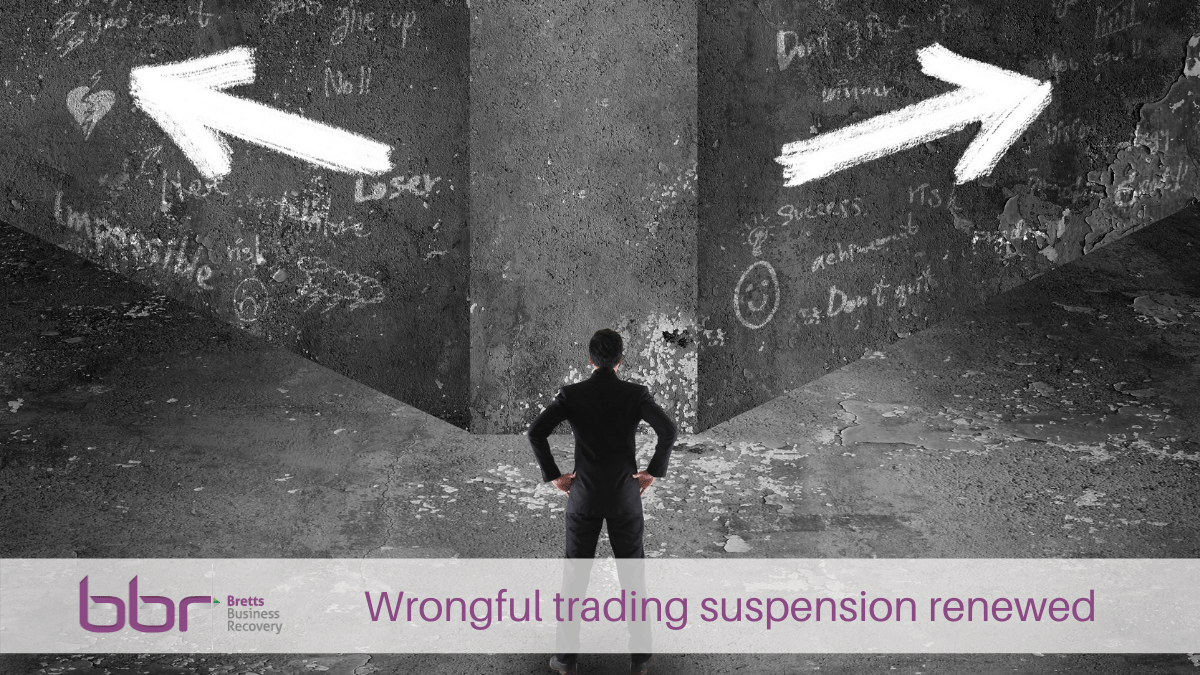Government reintroduces suspension of wrongful trading rules

Government (belatedly) reintroduces suspension of wrongful trading rules
The wrongful trading suspension was reactivated by the UK Government last week.
What does this mean?
In insolvency, directors that side-step their legal and fiduciary responsibilities may be disqualified from being able to act as a director for a period of time.
When a company is insolvent, the director’s primary duty of care is to the creditors of the company – not themselves or the shareholders. In normal circumstances, if the director continues to trade and increases the debt of the company, they risk personal liability for losses incurred during the wrongful trading period and possible disqualification from acting as a director in the future.
The Corporate Insolvency and Governance Act (CIGA) (enforced in June 2020) extended a temporary suspension of wrongful trading legislation giving directors the confidence to continue trading during COVID-19 without the risk of personal liability should the business subsequently become insolvent.
Quite reasonably in these circumstances, the Act advocated that courts will not hold directors responsible for any worsening of the financial position of the company or its creditors during the period 1 March and 30 September 2020. Then, to the dismay of many business groups, in its CIGA update of 25 September, the Government chose not to extend the suspension of wrongful trading provisions further.
However, on 26 November 2020 new legislation came into force renewing the suspension and giving directors of companies in financial difficulty a second breathing space from the financial impact of the wrongful trading provisions.
The new suspension will apply between 26 November 2020 and 30 April 2021. The new legislation also further extends the temporary modifications to the processes of corporate meetings until 30 March 2021.
Directors should continue to act responsibly
It is imperative that during difficult trading conditions directors remain vigilant and consider their responsibilities at every decision to avoid being found guilty of unfit conduct, misconduct or wrongful or fraudulent trading.
Whilst the suspension significantly reduces the threat of personal liability in insolvency, company directors must continue to be mindful of other considerations in continuing the activities of their business. Their fiduciary and other duties under the Companies Acts all still apply and, in addition to the wrongful trading provisions of the Insolvency Act 1986, the fraudulent trading and misfeasance provisions, amongst others, remain relevant.
Directors should evaluate (and document) carefully whether continuing to trade is in accordance with their wider duties as directors.
What is unfit conduct?
When a company enters insolvent liquidation or administration , or if there has been a complaint, the company and the conduct of individual directors are subject to a thorough investigation by the appointed insolvency practitioner and then further, when appropriate, by the Insolvency Service
The following are examples of unfit conduct for which the Department of Business Innovation and Skills (DeBIS) may ban directors:
- Failure to submit annual accounts and/or returns to Companies House on time
- Excessive salaries or drawings when the company was plainly insolvent
- Trading on when they knew the company was insolvent (trading whilst knowingly insolvent)
- Continuing to take credit when there was “no reasonable prospect” of creditors being paid
- Misrepresentation of the facts about the company
- Failure to respond or comply with a liquidator’s requests
- Knowingly carrying on a business with the intent to defraud or deceive creditors*.
* Fraudulent trading is a criminal offence and therefore, besides disqualification, directors may be subject to a custodial sentence and personal financial liability.
For details on directors’ responsibilities visit: www.gov.uk/guidance/being-a-company-director
Ensure you’re doing the right thing
Being a director of a business has never been more challenging. If you’re facing key decisions, take advice early to determine the risks and potential remedies that may be available.
For guidance on directors’ duties and obligations when facing cash flow problems or managing a business in distress, please contact us. We are happy to offer a no-obligation consultation to help you work out what to do next.